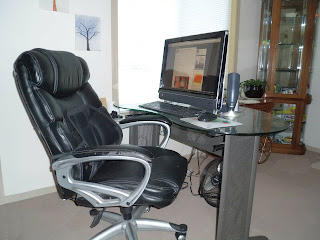How to avoid doing things that will postpone your literary success
 |
| Not having the ideal office chair should not stop you putting pen to paper |
Not getting
on with writing is often called procrastination, but I don’t like that label as
it implies there is something deliberate about doing things to avoid writing,
such as stopping to tidy your office, or sharpening all your pencils, or going
on social media.
Many ‘How to
Write’ books start with advice about finding a finding a suitable place in your
house to write. Then there will be suggestions about what IT equipment you
should have installed and many paragraphs will be devoted to the importance of choosing
a comfortable chair.
I’m not
saying any of these things aren’t helpful, but I don’t think they should stop
you getting on with your writing if you already have some good ideas for a
novel or a short story.
My advice
would be to get your ideas on paper as quickly as possible. You can always type
them up later and then revise what you have written as many times as you need
to.
I recently
read a book about how to write a crime novel that had several pages at the
beginning dedicated to the importance of attending writers’ conferences, just
to make you feel more like a writer!
I think that is a bad idea as it will just hold you up from starting to write. All you really need in order to get going are some strong ideas and a notebook and pen so that you can write the ideas down as soon as they occur to you. You should carry the notebook with you everywhere and note the ideas as quickly as you can while they are still fresh in your mind.
The other
thing you need to do is to decide what genre your proposed novel or story
belongs in and read some examples written by successful authors.
 |
| Make sure you carry a notebook and pen or pencil at all times |
It is
hopeless to try to write a detective novel, or a Regency romance, if you don’t ever
read that type of book. If you write the sort of book that you enjoy reading
yourself, you will already unconsciously have picked up the rules and
conventions of the genre and will have a feel for what is right and what isn’t,
as you write your own.
The plot of
a book never comes to you fully formed, but you will get ideas for characters
and settings as you go along and will need to make a note of everything that
occurs to you straight away.
It can all
be woven into a plot for a book with a beginning, middle and end and, hopefully,
a satisfying conclusion for the reader, later on.
I sometimes
get ideas for the novel I am currently working on as I am waking up in the
morning. If it is the weekend, it is tempting to turn over and go back to sleep,
and if it is a week day, you might be under time pressure to get up and start
your day. But if you can possibly spare a few minutes after you have woken up,
it is a good idea to write your ideas
down in your notebook before they are lost to you for ever.
Another
thing I find useful is a project book with coloured tabs separating the sections, so I can list in an organised way all the information about characters, setting, plot and themes that have occurred to
me randomly and been jotted down in my notebook.
Of course, it’s
nice to set up a smart, well-equipped writer’s office with a lovely,
comfortable chair to sit in, but it should not be at the expense of getting on
with your novel or short story.
It will
probably be obvious where you will find peace and quiet in your house to write
and you can make do with just the basic equipment and stationery you already
have, to begin with. If you later find your chair is uncomfortable, just swap it
with another one from somewhere else in your house.
Prolific and
successful writers, such as Charles Dickens and Wilkie Collins, probably didn’t
waste a second thinking about their chairs, but just got on with writing all
those books.
 |
| You could take a leaf out of the great Andrea Camilleri's book and write a letter to yourself |
Another
trick I have heard of is to just write anything you can think of on to the
blank page to get yourself going, even if it is a couple of lines of poetry, or
a paragraph of description that has no real connection with the story you are
working on.
You could
also take a tip from the great Italian crime writer, Andrea Camilleri, which I
once read about in one of his Inspector Montalbano novels, The Potter's Field. Montalbano has reached
deadlock in a case and can’t see any way forward, so he sits down and writes
himself a letter, taking himself to task for his obtuseness and what he feels
he has done wrong during his investigation.
You could
write to yourself along the same lines and say: ‘Dear author, What is the connection
between these two characters? Who has properties overlooking the field where
the body was found and has your detective been to see them all yet? What would your
protagonist usually do at this time of the day? How can you get him or her
further forward with what they are trying to achieve?’ Usually, the answers you
think of will help you get going with your story again.
But whatever
you do, don’t let trivial things delay you from starting to write in the first
place! You can wait until you have made some money from your first novel or
short story before you buy yourself a smart writer’s chair!